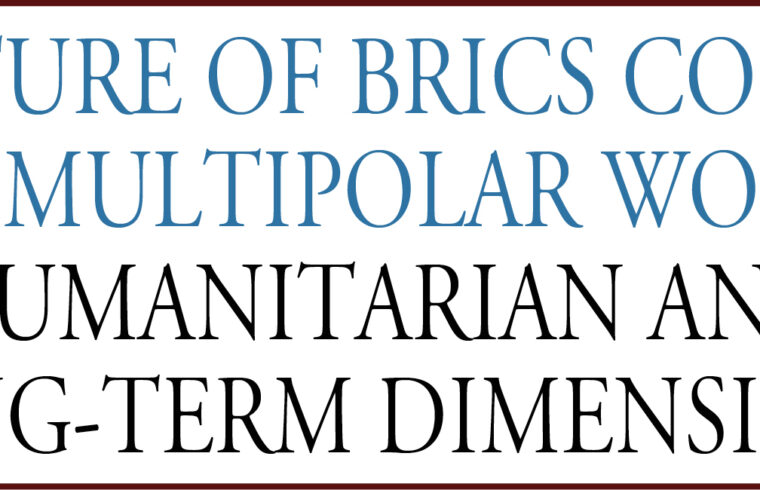Prof. Rasigan Maharajh
Chief Director: Institute for Economic Research on Innovation, Tshwane University of Technology
Many thanks to the organisers of this International Futurological Forum for your kind invitation to contribute to the discussion on the Future of BRICS Countries in the Multipolar World.
This Forum is taking place at a time in world history that is characterised by geopolitical tensions, international conflicts and global contestations.
It is precisely within this context that the need and demand for us to collectively and critically reflect upon our past and present circumstances that will afford us the opportunity to “jointly develop a philosophical basis for a peaceful multi-civilizational development of humanity” (Smart Civilization, 2024).
It is also relevant to our discussions that the preceding session of this Forum was moderated by Sergey Krikalyov, who is one of approximately 643 people that have ventured beyond the Kármán line of 100 km above our mean sea level of our home planet, Earth.
Our entire human population of over 8.1 billion people must benefit from the insights gained by those that have heroically ventured into space and seen our blue planet in its location in the cosmos.
Most of the cosmonauts, astronauts, and taikonauts have variously reported experiencing an ‘overview effect’ and that cognitive shift is of critical importance in our discussions about our long-term prospects on our home planet.
At the level of our species-being, our evolutionary success has been facilitated and augmented by our innate capacities and capabilities to better understand our circumstances and derive appropriate solutions to our existential challenges.
This process of cognition and communication has afforded us a ‘global knowledge commons’ that has served our collective interests over millennia.
The contemporary rise of multipolarity in world systems is also taking place at a time when developments in our scientific and technological competencies are also providing us with better and deeper appreciation of the biophysical processes that underpin life on our home planet.
The most recent global assessment of the Intergovernmental Panel on Climate Change affirmed the dangers associated with Global Warming of average temperature increases above 1.5° centigrade (Celsius scale), whilst also showing how anthropogenic greenhouse gases are causing unprecedented damage and concluding that if ‘business as usual’ continues, then many parts of our home planet will become unliveable in the next few decades.
Such dire warnings require and demand a more coherent and coordinated global response than what is currently available.
The learning achieved by those who ventured beyond our atmosphere are now even more prescient and important.
For us to collectively gain from their insights, and to maximise the potential benefit for all of humanity, it is crucial that we defend multipolarity against hegemonic threats of unilateralism.
It is also important that we advance the knowledge frontiers seeking a better understanding of our circumstances and exploring potential solutions and remedies.
By working together, in the BRICS+ format, and in other multilateral fora; some aspects of revisioning the future is beginning to become clearer.
To move from cogency to coherence however requires further collective effort. Amongst the core tasks include the intellectual liberation from the mental slavery () of centuries of combined and uneven development.
Much of the ways of seeing the world have been maligned though the inhumane experiences of colonialism, imperialism, slavery, and other forms of unfree labour regimes.
We must place more emphasis on rewriting the narrative of our common and shared humanity through decolonising the curricula through which intergenerational knowledge transmission is realised.
Some of these tasks may seem menial but they are not trivial as capturing the mind is crucial to ensuring world systems that work for all and especially the global majority.
It is also important that efforts be made in a more tangible and practical way to bolster our common humanity should we seek a shared destiny.
Humanitarian aid and support is therefore also of critical importance and should therefore feature more prominently in all our efforts at global development.
Drawing upon the uneven distribution of knowledge competences, it could prove useful for the BRICS+ to utilise their capacities and capabilities in science and technology to provide information and technical solutions on a more socialised basis.
Examples of such interventions could include more cooperation on near-earth observation systems that would provide improved and enhanced information to countries currently lacking such competences-
Sharing weather estimates and improving our capacities for predict changes would also enhance and improve the lives of many of the peoples of the world.
Being able to forecast disruptive change also delivers the mandate for better preparedness for impending calamities and disasters.
Our shared maturation as a species being must encourage us to provide the necessary solidarity and cooperation to those amongst us in most need.
Our invocation of the concept of civilisation is underpinned by a love of humanity and a desire to see us all prosper and thrive rather than become victims of zero-sum games where some gain on the basis of other losses.
We must remain steadfast in our determination to oppose all forms of hegemony and its various violences including the continuing genocide in West Asia.
Our contemporary conjuncture, our pushing against the biophysical planetary boundaries that sustain life, and our nurturing of a multipolar world system demands that we rise to our generational challenge of redressing the inequities inherited from the past and redefine our present in terms of diversity, complementarity, and coordination.
In conclusion, let us be reminded of a quote attributed to Nelson Madela: “It always seems impossible until it is done” (Nicholls, 2001).
Never in our past have we had the opportunity as presented to us today to co-create on a equitable basis the community to advance the prospects of a shared future for humankind.
Let us not fail in this mission-critical task.
I thank you for your attention.
References
IPCC. 2023. Synthesis Report of the IPCC Sixth Assessment Report, Intergovernmental Panel on Climate Change, World Meteorological Organization, Geneva.
Jinping, Xi. 2023. Full text of President Xi Jinping’s 2024 New Year message, Beijing, 31 December.
Maharajh, R. 2017. Sustainable Development (Goals) for Us All, Paper delivered to the Second Session of the Ninth Academic Forum of Brazil, Russia, India, China, and South Africa on Areas for Deepening BRICS Cooperation and Related Innovation held in Fuzhou, Peoples Republic of China, 10 June.
Maharajh, R. 2021. Advancing Sustainable Futures for All: 21st Century Public Engagement and Mission-orientated Research, Global Research Council, London.
Maharajh, R.; and Tivana, S. 2023. Ecocide or Socialism: Ecological Challenges and Neoliberal Capitalist Constrains on Radical Transformation, in Balfour, R.J. [editor] Mzala Nxumalo, Leftist Thought and Contemporary South Africa, Jacana, Johannesburg.
Nicholls, K. 2001. Sailor’s course one of success – Birds an inspiration, Illawarra Mercury, 21 April.
Putin, V. 2024. President of Russia Vladimir Putin’s speech at the meeting with senior staff of the Russian Foreign Ministry, Moscow, 14 June.
Smart Civilization. 2024. The BRICS Humanitarian Charter, Moscow.











